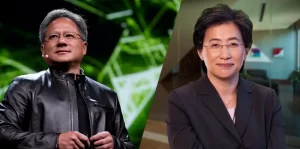Introduction:
On Tuesday, the U.S announced the revocation of several licenses permitting companies to export goods, including chips, to the sanctioned Chinese telecommunications equipment manufacturer, Huawei Technologies.
A source familiar with the situation reported that certain companies received notifications on Tuesday, revoking their licenses with immediate effect.
This decision follows the recent launch of Huawei’s inaugural AI-equipped laptop, the MateBook X Pro, which is powered by Intel’s latest Core Ultra 9 processor.
This decision, which comes amidst growing concerns over national security and technological competitiveness, marks a significant escalation in efforts to curtail Huawei’s access to crucial components for its products.
Follow us on LinkedIn for everything around Semiconductors & AI
Background of U.S Vs Huawei:
Since 2019, Huawei has drawn attention in U.S.-China trade tensions. Placed on a trade restriction list due to concerns over possible espionage activities and its links to the Chinese government, it remains a focal point.
This listing has necessitated that Huawei’s suppliers obtain special licenses before exporting goods to the company, a process fraught with complexities and uncertainties.
Despite these restrictions, Huawei has managed to sustain its operations by securing licenses worth billions of dollars from U.S. authorities.
Notably, a controversial authorization issued during the Trump administration allowed Intel to continue supplying central processors for Huawei’s laptops since 2020.
Additionally, Qualcomm has been licensing its portfolio of 5G technologies to Huawei, albeit amidst growing scrutiny.
Read More: What is Intel-Huawei Export License Controversy & Why AMD is Bleeding Over this?
Recent Developments in U.S Vs Huawei
The recent move by the U.S. to revoke certain export licenses signifies a heightened effort to restrict Huawei’s access to critical technologies.
“This action will bolster U.S. national security, protect American ingenuity, and diminish Communist China’s ability to advance its technology,”
~Republican Congresswoman Elise Stefanik
While the authorities haven’t disclosed the specific licenses impacted, analysts anticipate substantial repercussions for both Huawei and its U.S. suppliers.
The timing of this decision is notable, coinciding with the launch of Huawei’s latest AI-enabled laptop, the MateBook X Pro, powered by Intel’s new Core Ultra 9 processor.
The launch drew criticism from Republican lawmakers, who interpreted it as an indication of leniency from the Commerce Department towards Intel’s dealings with Huawei.
Read More: 30% Cheaper: Mindgrove Launches India’s First Commercial SoC – techovedas
Implications:
The revocation of export licenses is likely to impact Huawei’s supply chain and its ability to produce and innovate.
With Huawei still relying on Intel chips for its laptops, the decision could disrupt its operations and hinder its competitiveness in the global market.
An Intel spokesperson refrained from providing a comment, while Huawei did not respond immediately to requests for comment.
Moreover, U.S. suppliers, including Intel and Qualcomm, may also face repercussions. The loss of Huawei as a significant customer could dent their revenues and profitability, particularly as Huawei has been a major player in the smartphone and telecommunications sectors.
Read More: China Bans Intel and AMD From Government Computers
Future Outlook:
The escalating trade tensions between the U.S. and China, particularly concerning Huawei, are expected to have far-reaching consequences for the global technology industry.
As both countries vie for technological dominance, companies and investors must navigate an increasingly complex and uncertain landscape.
Furthermore, the revocation of export licenses underscores the need for a comprehensive approach to address national security concerns while preserving innovation and economic growth.
Striking a balance between safeguarding sensitive technologies and fostering international collaboration will be paramount in shaping the future of the global technology ecosystem.
Conclusion:
The decision to revoke export licenses to Huawei represents a significant escalation in the U.S.-China trade war and underscores the broader geopolitical tensions surrounding technological supremacy.




